Unit 9 Have you ever been to a museum? SectionA 1a-2d 课件(共50张PPT,无音频)
文档属性
| 名称 | Unit 9 Have you ever been to a museum? SectionA 1a-2d 课件(共50张PPT,无音频) | 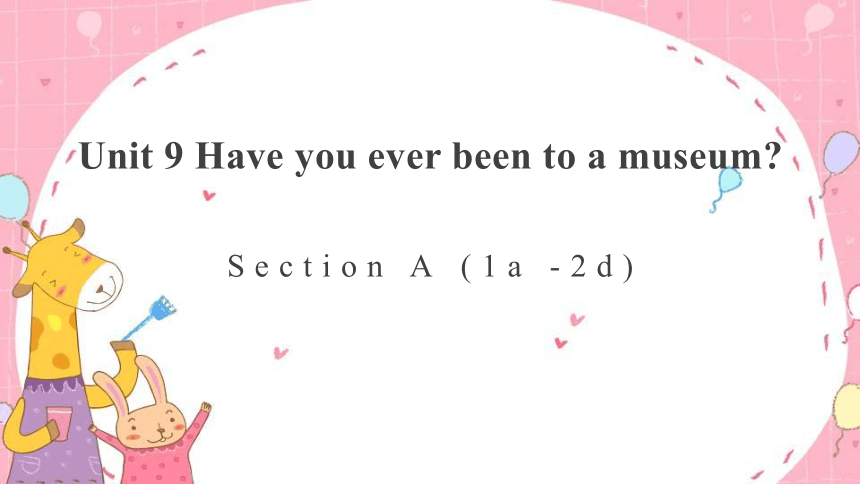 | |
| 格式 | pptx | ||
| 文件大小 | 2.4MB | ||
| 资源类型 | 教案 | ||
| 版本资源 | 人教新目标(Go for it)版 | ||
| 科目 | 英语 | ||
| 更新时间 | 2022-05-19 15:58:15 | ||
图片预览

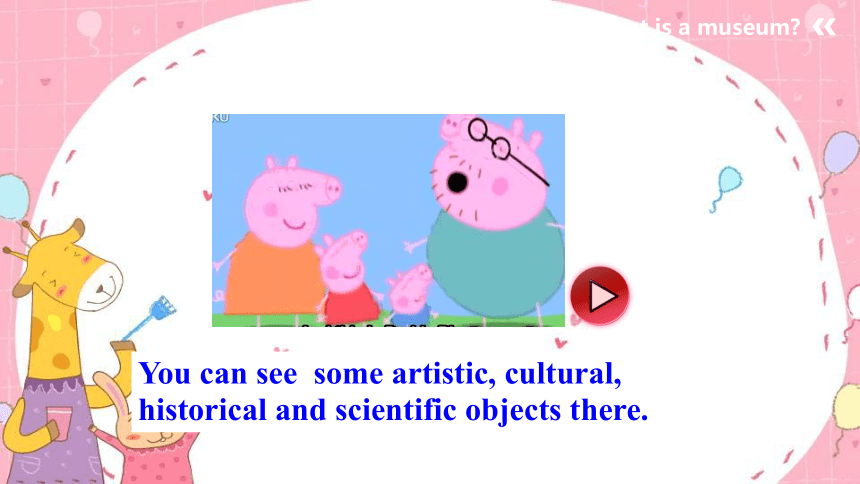
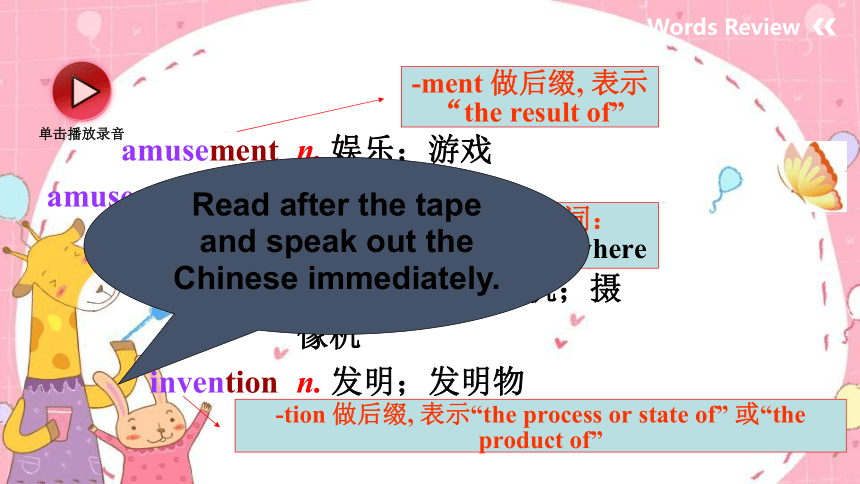
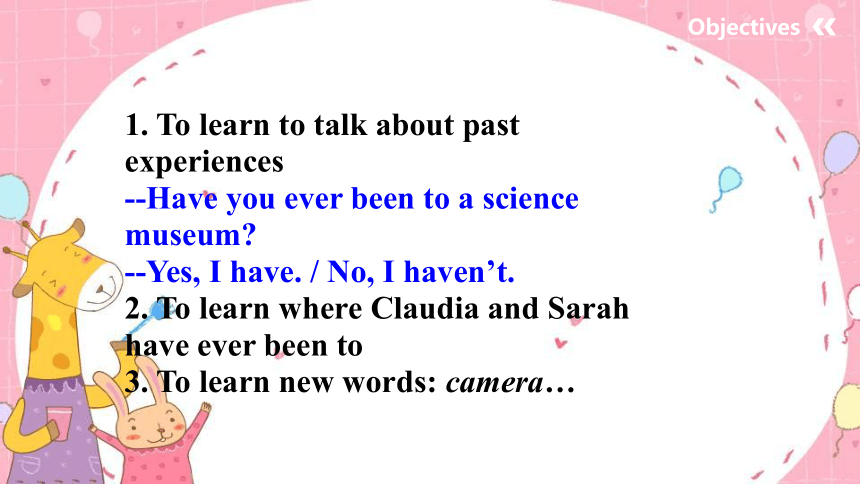
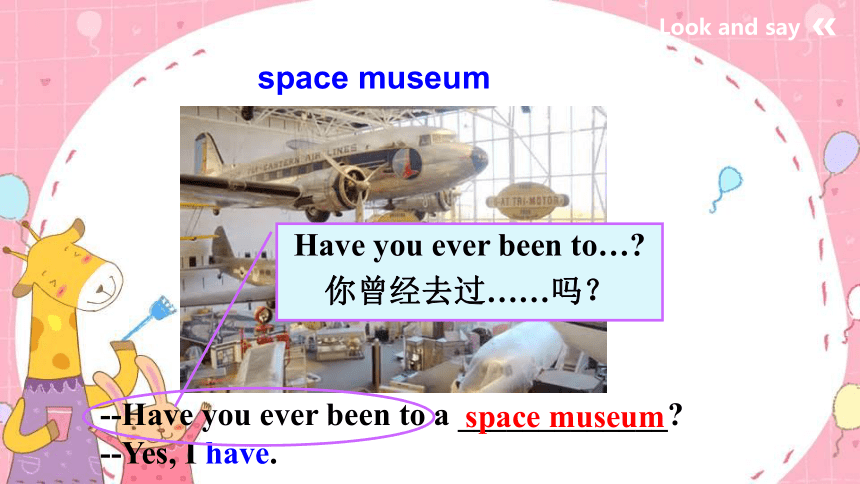
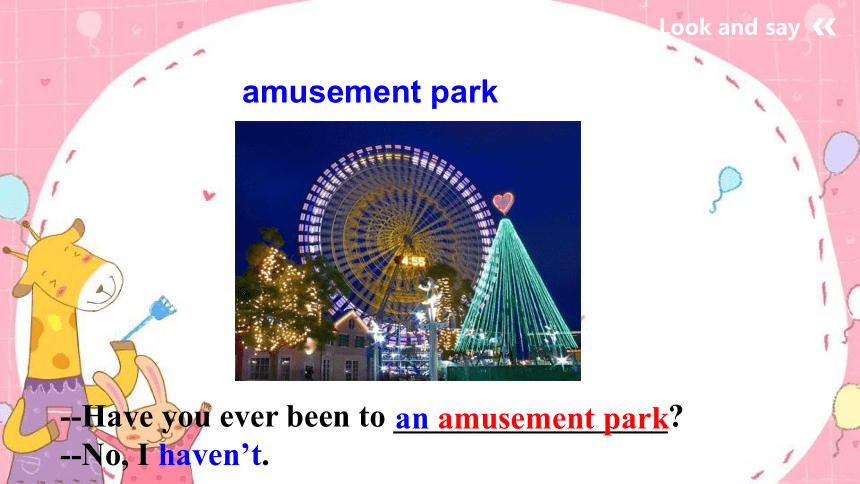
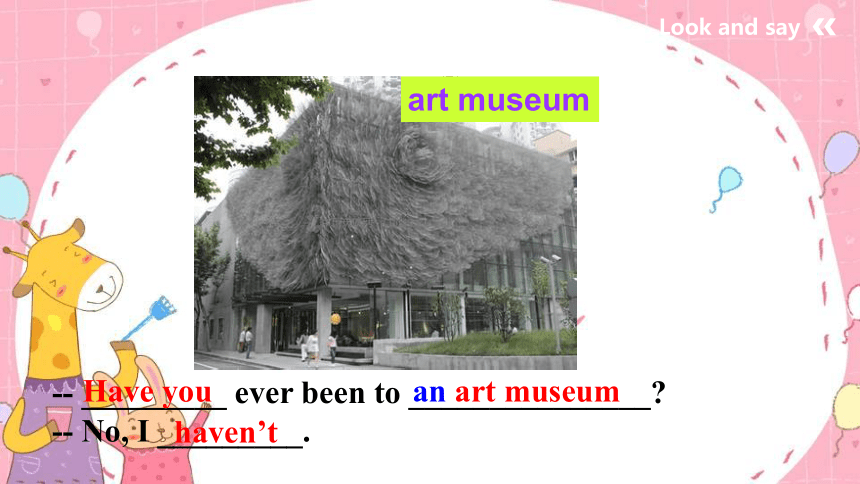
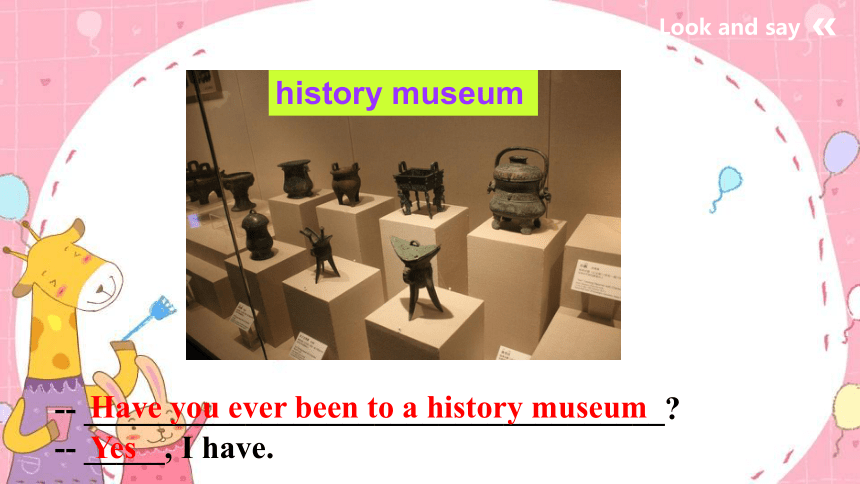
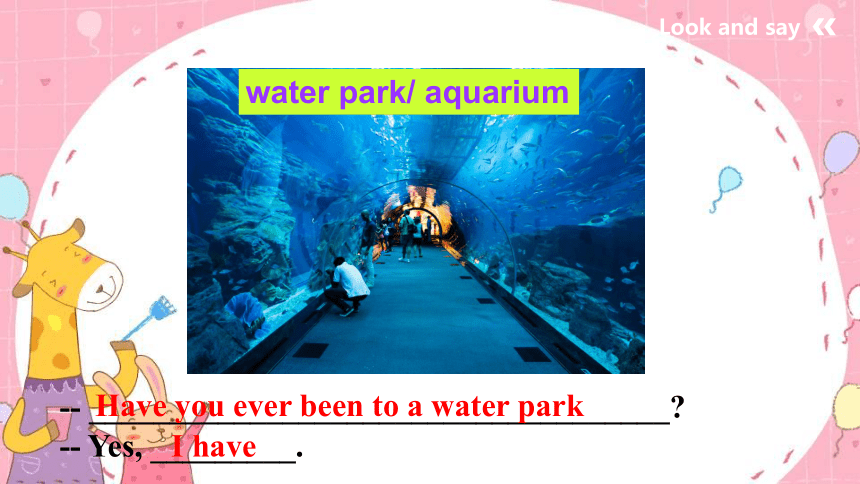
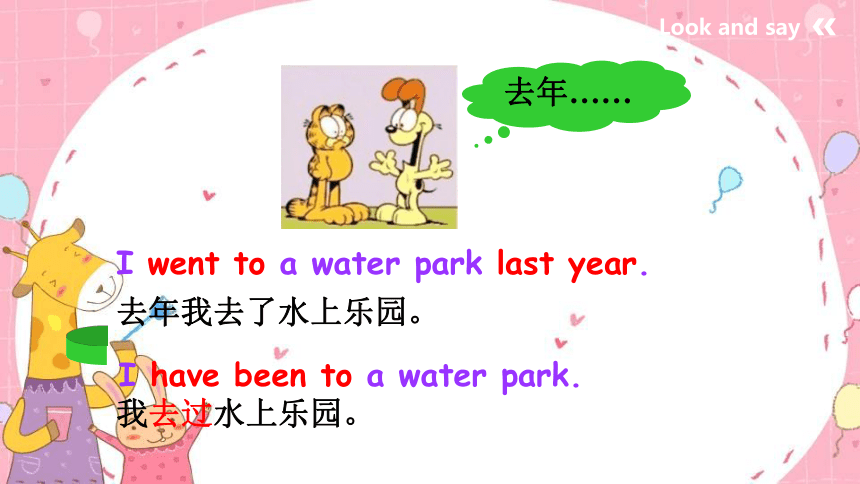
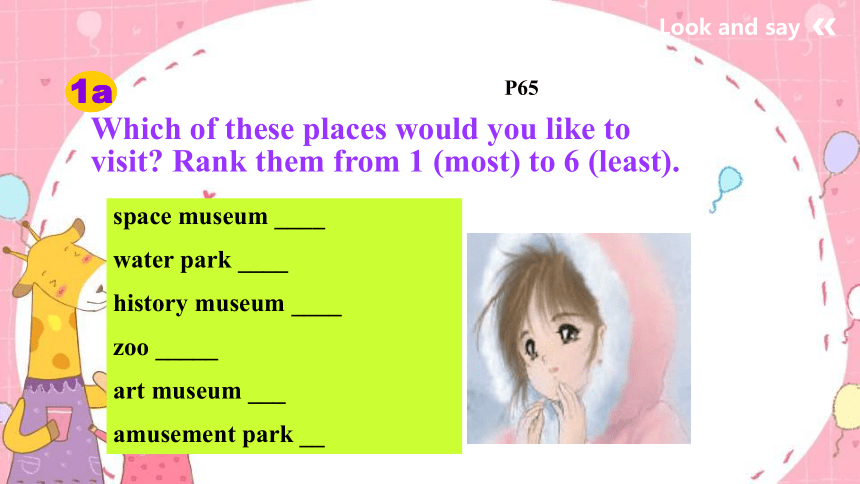
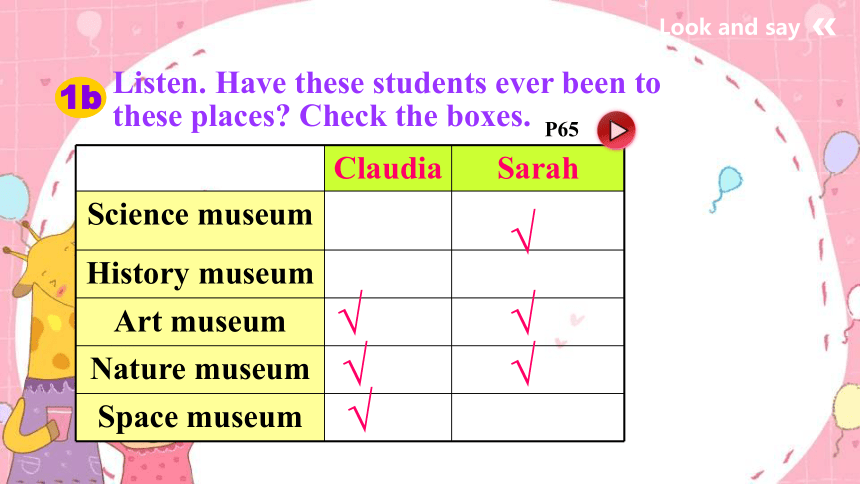
文档简介
(共50张PPT)
Unit 9 Have you ever been to a museum
Section A (1a -2d)
What is a museum
It’s a place full of interesting things that are very old.
You can see some artistic, cultural, historical and scientific objects there.
Words Review
amusement
amusement park
somewhere
camera
invention
n. 娱乐;游戏
游乐场
adv. 在某处;到某处
n. 照相机;摄影机;摄像机
n. 发明;发明物
单击播放录音
合成词:
some + where
-ment 做后缀, 表示“the result of”
-tion 做后缀, 表示“the process or state of” 或“the product of”
Read after the tape and speak out the Chinese immediately.
Objectives
1. To learn to talk about past
experiences
--Have you ever been to a science museum
--Yes, I have. / No, I haven’t.
2. To learn where Claudia and Sarah have ever been to
3. To learn new words: camera…
Look and say
--Have you ever been to a _____________
--Yes, I have.
space museum
space museum
Have you ever been to…
你曾经去过……吗?
Look and say
amusement park
--Have you ever been to _________________
--No, I haven’t.
an amusement park
Look and say
-- _________ ever been to _______________
-- No, I _________.
art museum
Have you
an art museum
haven’t
Look and say
history museum
-- ____________________________________
-- _____, I have.
Have you ever been to a history museum
Yes
Look and say
water park/ aquarium
-- ____________________________________
-- Yes, _________.
Have you ever been to a water park
I have
Look and say
I have been to a water park.
I went to a water park last year.
去年我去了水上乐园。
我去过水上乐园。
去年……
Look and say
Which of these places would you like to visit Rank them from 1 (most) to 6 (least).
space museum ____
water park ____
history museum ____
zoo _____
art museum ___
amusement park __
1a
P65
Look and say
Listen. Have these students ever been to
these places Check the boxes.
Claudia Sarah
Science museum
History museum
Art museum
Nature museum
Space museum
√
√
√
√
√
√
1b
P65
Look and say
1. Sarah: Have you ____ _____ to a history museum
Claudia: No, I haven’t.
Sarah: ___________.
2. Claudia: I ___ ____ ___ the art museum many times.
Sarah: _________.
3. _______ would like to go to the space
museum again.
Me neither
ever been
’ve been to
Me too
Claudia
Listen again and fill in the blanks.
Look and say
听力原文
提建议句型:Let’s…/How about…
回答:That sounds good but…/That’s a great idea.
---Have you ever been to…
你曾经去过……吗?
---Yes, I have./ No, I haven’t.
(肯定回答和否定回答)
Look and say
A: Let’s go somewhere different today.
B: OK. Where do you want to go
A: Have you ever been to the space museum
B: No, I haven’t. How about you
A: …
Ask and answer questions about the places in 1b.
Pair work
1c
P65
Example
A: Let’s go somewhere interesting today.
B: OK. Where do you want to go
A: Have you ever been to a water park
B: No, I haven’t. How about you
A:I have been there only once.
B: …
Example
How many places are there in the
picture What are they
Example
Look at the map of the town. Listen and
circle the places you hear.
2a
P66
Example
Conversation 1
Tina went to the space musement
last year. T F
Jone has never been to the space
museum. T F
They are going to take the subway. T F
Listen again and circle T or F.
2b
P66
Example
Conversation 2
Linda has been to the amusement
park. T F
Linda went to the amusement
park yesterday. T F
Linda is going to the amusement
park again by bike. T F
a long time ago.
Example
Conversation 3
Frank had a great time at the
water park. T F
Frank’s friend has never been
to the water park. T F
Frank and his friend are going
skating. T F
has never been to
听力原文
Pair work
A: Have you ever been to the space
museum
B: Yes, I have. How about you
A: No, I haven’t.
B: Oh, it’s fantastic. Let’s go tomorrow.
A: OK. How are we going to get there
B: We can take the subway.
Look at the map in 2a and make
conversations about the places.
2c
P66
Pair work
Sample:
A: Have you ever been to an amusement
park
B: No, I haven’t. How about you
A: Yes, I have. It’s really interesting. Let’s go this weekend.
B: OK. How are we going to get there
A: We can ride our bikes there.
Pair work
Read the dialogue in 2d, then answer the questions below.
1.Where did Anna go last weekend
She went to the film museum.
2.Has Jill ever been there before
Yes, she has.
3.What did Jill learn at the film museum
She learned about the inventions that led to color movies.
4.What did Jill do on the weekend
She went camping.
5.What did Jill do at the campsite
She put up a tent and cooked outside.
Pair work
Read and try to recite the conversations in 5-10 minutes.
Role-play
1. Role play the conversation in groups;
2. Role play the conversation in front of the class
Let’s see which group does the best.
2d
Role-play
Anna: I went to the film museum last weekend. _________________________
Jill: Yes, ________. I went there back in April.
Anna: It’s really interesting, _______ _________ ____________ spend a Saturday afternoon.
Jill: Yes, I love all the old movie cameras there. I ______________ the inventions that ______ color movies, too.
Anna: So, what did you do ______________
Jill: I ______________________ with some friends. We __________ a tent and cooked outside.
Anna: That sounds fun. _____________________.
Jill: You should try it!
Have you ever been there
I have
isn’t it
It’s a
great way to
learned about
led to
on the weekend
camped in the mountains
put up
I’ve never been camping
Read the dialogue in 2d, then fill in the blanks below.
Role-play
Anna: I went to the museum last film weekend. ever Have you been there
Jill: have Yes, I. I there back in went April.
Anna: It’s really, isn’t interesting it It’s spend a great way to a Saturday afternoon.
Jill: Yes, I love cameras all the old movie there. I learned led the inventions that about to color movies, too.
Anna: So, did you do on what the weekend
Jill: I in the mountains with camped some friends. We cooked put up a and tent outside.
Anna: sounds That fun. I’ve camping never been.
Jill: You try should it!
I went to the film museum last weekend.
Have you ever been there
Yes, I have. I went there back in April.
way to spend a Saturday afternoon.
It’s really interesting, isn’t it It’s a great
Yes, I love all the old movie cameras there.
I learned about the inventions that led to color movies, too.
So, what did you do on the weekend
We put up a tent and cooked outside.
I camped in the mountains with some friends.
That sounds fun. I’ve never been camping.
You should try it!
Read the conversation in 2d and learn it by your heart. Then try to make the conversation in the right order.
Role-play
Anna and Jill ___________ a film museum. It’s really interesting. It’s a great way ________ a Saturday afternoon. Jill loved all the old movie cameras there. He _________ ______ the inventions that ________ color movies, too. Jill __________ camped in the mountains with some friends. They ________ a tent and cooked outside.
Fill in the blanks according to the conversation.
have been to
to spend
about
led to
has been
learned
put up
Role-play
Write down these phrases in English.
1) 太空博物馆 _________________
2) 历史博物馆 ________________
3) 艺术博物馆 _______________
4) 回去 _______________
5) 学习关于…… _________________
space museum
history museum
go back
art museum
learn about …
Language points
1. — Have you ever been to a history museum
— No, I haven’t.
— Me neither.
*Me neither = Neither have I.
*Me neither: “我也不(没)”,与Me too意思相对。
Language points
【改写句子】
She has never been there. I have never
been there, either. (改为同义句)
She has never been there. __________.
Me neither
他没去上学。
He didn’t go to school.
我也没去。
Me neither.
Neither did I.
I didn’t go to school, either.
Language points
(1) 表示后者与前者情形相同“也不……”
neither+助动词/系动词be/情态动词+主
语 (否定)
I’m not tall. Neither is she.
= She’s not tall, either.
我个子不高,她个子也不高。
(2) 表示后者与前者情形相同,“也……”,
so+助动词/系动词be/情态动词+主语 (肯定)
My friends are happy. So am I.
= I’m happy, too./ I’m also happy.
我的朋友高兴,我也很高兴。
Language points
meaning usage
both
neither
either
both / neither / either用法辨析
either of作主语时,谓语动词用单数
Either of them is a doctor.
他们两个中有一个是医生。
neither of作主语时,谓语动词用单数
Neither of them was interested in going to the concert.
他们俩都不想去听音乐会。
both of做主语时谓语动词用复数
Both of my grandfathers are farmers. 我的祖父和外祖父都是农民。
两者中的任何一个
两者都不
(表示全否定)
两者都
Language points
2. I learned about the inventions that led to color movies, too.
Practise
我们听到这个消息十分悲痛。
It gave us much pain to learn of the news.
有关会议的情况你是怎么知道的?
How did you learn about the meeting
learn: to get knowledge or skill in a new subject or activity 了解;获知;得知
learn about/of + 所获知的具体内容
Language points
3. I’ve never been camping. 我从未野营过。
Practise
他一下午都在看电视。
He’s been watching TV all afternoon.
*现在完成进行时: have been + V-ing形式
*表示从过去某一时刻一直延续至今的动作
*在本句中,说话人使用这一时态来强调自己至今从未有过野营的经历,欠缺这方面的经验
Language points
4. It’s a great way to spend a Saturday afternoon.
spend: to use time doing something or being somewhere 打发时间,花费
spend … on sth: 花费……在某事上
spend … (in) doing sth: 花费……做某事上
昨天晚上我花了两个小时做作业。
I spent two hours on my homework last night.
I spent two hours (in) doing homework last night.
Practise
Language points
5. I learned about the inventions that led to color movies, too.
invent v.发明,创造
invention n.发明,创造; [C]发明物
inventor n.发明家,发明者(人)
用invent, invention或inventor的适当形式填空:
①Edison was a great__________.
②Alexander Bell _________the telephone in
1876.
③The world changed rapidly after the
___________of the computer.
invented
invention
inventor
Language points
lead to … If an action or event leads to something, it causes that thing to happen or exist 导致,带来,通向……
Eating too much sugar can lead to health problems.
A diet that is high in fat can lead to obesity.
Practise
高脂肪饮食会导致肥胖。
吃太多的糖会引起健康问题。
Language points
5. Let’s go to one tomorrow.
咱们明天去一个(历史博物馆)吧。
1. *let’s…: let us 的缩写,用于向别人提出建议,“让我们……”
* let’s/ let us do sth.
* 答语:That’s a good idea./ Good idea./ OK.
* let sb. do sth.: “让某人做某事”
--今天晚上咱们去看电影吧。
--好主意。
--Let’s go to the movies this morning.
--Good idea.
让吉姆独自回家吧。
Let Jim go home alone.
Language points
2. 辨析one, that 与it
1) one: 泛指,代替前面提到过的同类人或物中的一个,代替可数名词单数;复数形式:ones
2) that: 特指,与所指名词同类,但不是同一个;可代替上文提到的事情和不可数名词
3) it: 指代前文提到过的同一事物
Language points
--那个男孩是我的弟弟。
--哪一个?
--骑自行车的那个。
--That boy is my brother.
--Which one
--The one on a bike.
中国的人口比美国的人口多的多。
The population of China is much larger than that of America.
-- 你的汽车在哪儿?
-- 在车库里(garage)。
-- Where is your car
-- It is in the garage.
Language points
6. Frank had a great time at the water park.
弗兰克在水上公园玩得很高兴。
*have a great time: “过得愉快,玩得高兴”
*have a great time = have a good/ wonderful/ nice time = have fun = enjoy oneself
联欢会上你玩得开心吗?
Did you have a great time at the party
Language points
1. 父母都不关心这孩子。
________ parent cares what happens
to the child.
2. —我从没去过美国。
—我也没有。
—I have never been to America.
—____ _______.
一、根据汉语提示补全句子。
Neither
Me neither
Language points
1. —I ______ ever _______ (visit) the
Great Wall. What about you
—I _______ (visit) it when I was ten
years old.
2. Tom __________ (not be) to Disneyland
and he ________ (go) there with his
parents this weekend.
二、用所给单词的正确形式填空。
have
visited
visited
hasn’t been
is going
Language points
3. —Where’s Zhang Peng
—He ________ (go) to our math
teacher’s office.
—How soon ______ he ______ (come)
back
—In a few minutes, I think.
4. —How long have you been ________
(study) in this school
—For more than two years.
studying
has gone
will
come
Language points
三、翻译下面句子。
1. - 你去过科学博物馆吗?
- 我从没去过科学博物馆。
2. - 我从没去过水上公园。
- 我也没去过。
Have you ever been to a science
museum
No, I’ve never been to a science
museum.
I’ve never been to a water park.
Me neither.
Language points
四、根据汉语意思完成句子。每空一词。
1. 你曾经去过长城吗?
____ you _____ ______ ____ the
Great Wall
2. 我从没听到过南希说反对她的话。
I _____ ______ _______ Nancy say
anything against her.
3. 他已经去过北京三次了。
He _____ ______ ____Beijing three times.
has been to
Have ever been to
have never heard
谢 谢!
Unit 9 Have you ever been to a museum
Section A (1a -2d)
What is a museum
It’s a place full of interesting things that are very old.
You can see some artistic, cultural, historical and scientific objects there.
Words Review
amusement
amusement park
somewhere
camera
invention
n. 娱乐;游戏
游乐场
adv. 在某处;到某处
n. 照相机;摄影机;摄像机
n. 发明;发明物
单击播放录音
合成词:
some + where
-ment 做后缀, 表示“the result of”
-tion 做后缀, 表示“the process or state of” 或“the product of”
Read after the tape and speak out the Chinese immediately.
Objectives
1. To learn to talk about past
experiences
--Have you ever been to a science museum
--Yes, I have. / No, I haven’t.
2. To learn where Claudia and Sarah have ever been to
3. To learn new words: camera…
Look and say
--Have you ever been to a _____________
--Yes, I have.
space museum
space museum
Have you ever been to…
你曾经去过……吗?
Look and say
amusement park
--Have you ever been to _________________
--No, I haven’t.
an amusement park
Look and say
-- _________ ever been to _______________
-- No, I _________.
art museum
Have you
an art museum
haven’t
Look and say
history museum
-- ____________________________________
-- _____, I have.
Have you ever been to a history museum
Yes
Look and say
water park/ aquarium
-- ____________________________________
-- Yes, _________.
Have you ever been to a water park
I have
Look and say
I have been to a water park.
I went to a water park last year.
去年我去了水上乐园。
我去过水上乐园。
去年……
Look and say
Which of these places would you like to visit Rank them from 1 (most) to 6 (least).
space museum ____
water park ____
history museum ____
zoo _____
art museum ___
amusement park __
1a
P65
Look and say
Listen. Have these students ever been to
these places Check the boxes.
Claudia Sarah
Science museum
History museum
Art museum
Nature museum
Space museum
√
√
√
√
√
√
1b
P65
Look and say
1. Sarah: Have you ____ _____ to a history museum
Claudia: No, I haven’t.
Sarah: ___________.
2. Claudia: I ___ ____ ___ the art museum many times.
Sarah: _________.
3. _______ would like to go to the space
museum again.
Me neither
ever been
’ve been to
Me too
Claudia
Listen again and fill in the blanks.
Look and say
听力原文
提建议句型:Let’s…/How about…
回答:That sounds good but…/That’s a great idea.
---Have you ever been to…
你曾经去过……吗?
---Yes, I have./ No, I haven’t.
(肯定回答和否定回答)
Look and say
A: Let’s go somewhere different today.
B: OK. Where do you want to go
A: Have you ever been to the space museum
B: No, I haven’t. How about you
A: …
Ask and answer questions about the places in 1b.
Pair work
1c
P65
Example
A: Let’s go somewhere interesting today.
B: OK. Where do you want to go
A: Have you ever been to a water park
B: No, I haven’t. How about you
A:I have been there only once.
B: …
Example
How many places are there in the
picture What are they
Example
Look at the map of the town. Listen and
circle the places you hear.
2a
P66
Example
Conversation 1
Tina went to the space musement
last year. T F
Jone has never been to the space
museum. T F
They are going to take the subway. T F
Listen again and circle T or F.
2b
P66
Example
Conversation 2
Linda has been to the amusement
park. T F
Linda went to the amusement
park yesterday. T F
Linda is going to the amusement
park again by bike. T F
a long time ago.
Example
Conversation 3
Frank had a great time at the
water park. T F
Frank’s friend has never been
to the water park. T F
Frank and his friend are going
skating. T F
has never been to
听力原文
Pair work
A: Have you ever been to the space
museum
B: Yes, I have. How about you
A: No, I haven’t.
B: Oh, it’s fantastic. Let’s go tomorrow.
A: OK. How are we going to get there
B: We can take the subway.
Look at the map in 2a and make
conversations about the places.
2c
P66
Pair work
Sample:
A: Have you ever been to an amusement
park
B: No, I haven’t. How about you
A: Yes, I have. It’s really interesting. Let’s go this weekend.
B: OK. How are we going to get there
A: We can ride our bikes there.
Pair work
Read the dialogue in 2d, then answer the questions below.
1.Where did Anna go last weekend
She went to the film museum.
2.Has Jill ever been there before
Yes, she has.
3.What did Jill learn at the film museum
She learned about the inventions that led to color movies.
4.What did Jill do on the weekend
She went camping.
5.What did Jill do at the campsite
She put up a tent and cooked outside.
Pair work
Read and try to recite the conversations in 5-10 minutes.
Role-play
1. Role play the conversation in groups;
2. Role play the conversation in front of the class
Let’s see which group does the best.
2d
Role-play
Anna: I went to the film museum last weekend. _________________________
Jill: Yes, ________. I went there back in April.
Anna: It’s really interesting, _______ _________ ____________ spend a Saturday afternoon.
Jill: Yes, I love all the old movie cameras there. I ______________ the inventions that ______ color movies, too.
Anna: So, what did you do ______________
Jill: I ______________________ with some friends. We __________ a tent and cooked outside.
Anna: That sounds fun. _____________________.
Jill: You should try it!
Have you ever been there
I have
isn’t it
It’s a
great way to
learned about
led to
on the weekend
camped in the mountains
put up
I’ve never been camping
Read the dialogue in 2d, then fill in the blanks below.
Role-play
Anna: I went to the museum last film weekend. ever Have you been there
Jill: have Yes, I. I there back in went April.
Anna: It’s really, isn’t interesting it It’s spend a great way to a Saturday afternoon.
Jill: Yes, I love cameras all the old movie there. I learned led the inventions that about to color movies, too.
Anna: So, did you do on what the weekend
Jill: I in the mountains with camped some friends. We cooked put up a and tent outside.
Anna: sounds That fun. I’ve camping never been.
Jill: You try should it!
I went to the film museum last weekend.
Have you ever been there
Yes, I have. I went there back in April.
way to spend a Saturday afternoon.
It’s really interesting, isn’t it It’s a great
Yes, I love all the old movie cameras there.
I learned about the inventions that led to color movies, too.
So, what did you do on the weekend
We put up a tent and cooked outside.
I camped in the mountains with some friends.
That sounds fun. I’ve never been camping.
You should try it!
Read the conversation in 2d and learn it by your heart. Then try to make the conversation in the right order.
Role-play
Anna and Jill ___________ a film museum. It’s really interesting. It’s a great way ________ a Saturday afternoon. Jill loved all the old movie cameras there. He _________ ______ the inventions that ________ color movies, too. Jill __________ camped in the mountains with some friends. They ________ a tent and cooked outside.
Fill in the blanks according to the conversation.
have been to
to spend
about
led to
has been
learned
put up
Role-play
Write down these phrases in English.
1) 太空博物馆 _________________
2) 历史博物馆 ________________
3) 艺术博物馆 _______________
4) 回去 _______________
5) 学习关于…… _________________
space museum
history museum
go back
art museum
learn about …
Language points
1. — Have you ever been to a history museum
— No, I haven’t.
— Me neither.
*Me neither = Neither have I.
*Me neither: “我也不(没)”,与Me too意思相对。
Language points
【改写句子】
She has never been there. I have never
been there, either. (改为同义句)
She has never been there. __________.
Me neither
他没去上学。
He didn’t go to school.
我也没去。
Me neither.
Neither did I.
I didn’t go to school, either.
Language points
(1) 表示后者与前者情形相同“也不……”
neither+助动词/系动词be/情态动词+主
语 (否定)
I’m not tall. Neither is she.
= She’s not tall, either.
我个子不高,她个子也不高。
(2) 表示后者与前者情形相同,“也……”,
so+助动词/系动词be/情态动词+主语 (肯定)
My friends are happy. So am I.
= I’m happy, too./ I’m also happy.
我的朋友高兴,我也很高兴。
Language points
meaning usage
both
neither
either
both / neither / either用法辨析
either of作主语时,谓语动词用单数
Either of them is a doctor.
他们两个中有一个是医生。
neither of作主语时,谓语动词用单数
Neither of them was interested in going to the concert.
他们俩都不想去听音乐会。
both of做主语时谓语动词用复数
Both of my grandfathers are farmers. 我的祖父和外祖父都是农民。
两者中的任何一个
两者都不
(表示全否定)
两者都
Language points
2. I learned about the inventions that led to color movies, too.
Practise
我们听到这个消息十分悲痛。
It gave us much pain to learn of the news.
有关会议的情况你是怎么知道的?
How did you learn about the meeting
learn: to get knowledge or skill in a new subject or activity 了解;获知;得知
learn about/of + 所获知的具体内容
Language points
3. I’ve never been camping. 我从未野营过。
Practise
他一下午都在看电视。
He’s been watching TV all afternoon.
*现在完成进行时: have been + V-ing形式
*表示从过去某一时刻一直延续至今的动作
*在本句中,说话人使用这一时态来强调自己至今从未有过野营的经历,欠缺这方面的经验
Language points
4. It’s a great way to spend a Saturday afternoon.
spend: to use time doing something or being somewhere 打发时间,花费
spend … on sth: 花费……在某事上
spend … (in) doing sth: 花费……做某事上
昨天晚上我花了两个小时做作业。
I spent two hours on my homework last night.
I spent two hours (in) doing homework last night.
Practise
Language points
5. I learned about the inventions that led to color movies, too.
invent v.发明,创造
invention n.发明,创造; [C]发明物
inventor n.发明家,发明者(人)
用invent, invention或inventor的适当形式填空:
①Edison was a great__________.
②Alexander Bell _________the telephone in
1876.
③The world changed rapidly after the
___________of the computer.
invented
invention
inventor
Language points
lead to … If an action or event leads to something, it causes that thing to happen or exist 导致,带来,通向……
Eating too much sugar can lead to health problems.
A diet that is high in fat can lead to obesity.
Practise
高脂肪饮食会导致肥胖。
吃太多的糖会引起健康问题。
Language points
5. Let’s go to one tomorrow.
咱们明天去一个(历史博物馆)吧。
1. *let’s…: let us 的缩写,用于向别人提出建议,“让我们……”
* let’s/ let us do sth.
* 答语:That’s a good idea./ Good idea./ OK.
* let sb. do sth.: “让某人做某事”
--今天晚上咱们去看电影吧。
--好主意。
--Let’s go to the movies this morning.
--Good idea.
让吉姆独自回家吧。
Let Jim go home alone.
Language points
2. 辨析one, that 与it
1) one: 泛指,代替前面提到过的同类人或物中的一个,代替可数名词单数;复数形式:ones
2) that: 特指,与所指名词同类,但不是同一个;可代替上文提到的事情和不可数名词
3) it: 指代前文提到过的同一事物
Language points
--那个男孩是我的弟弟。
--哪一个?
--骑自行车的那个。
--That boy is my brother.
--Which one
--The one on a bike.
中国的人口比美国的人口多的多。
The population of China is much larger than that of America.
-- 你的汽车在哪儿?
-- 在车库里(garage)。
-- Where is your car
-- It is in the garage.
Language points
6. Frank had a great time at the water park.
弗兰克在水上公园玩得很高兴。
*have a great time: “过得愉快,玩得高兴”
*have a great time = have a good/ wonderful/ nice time = have fun = enjoy oneself
联欢会上你玩得开心吗?
Did you have a great time at the party
Language points
1. 父母都不关心这孩子。
________ parent cares what happens
to the child.
2. —我从没去过美国。
—我也没有。
—I have never been to America.
—____ _______.
一、根据汉语提示补全句子。
Neither
Me neither
Language points
1. —I ______ ever _______ (visit) the
Great Wall. What about you
—I _______ (visit) it when I was ten
years old.
2. Tom __________ (not be) to Disneyland
and he ________ (go) there with his
parents this weekend.
二、用所给单词的正确形式填空。
have
visited
visited
hasn’t been
is going
Language points
3. —Where’s Zhang Peng
—He ________ (go) to our math
teacher’s office.
—How soon ______ he ______ (come)
back
—In a few minutes, I think.
4. —How long have you been ________
(study) in this school
—For more than two years.
studying
has gone
will
come
Language points
三、翻译下面句子。
1. - 你去过科学博物馆吗?
- 我从没去过科学博物馆。
2. - 我从没去过水上公园。
- 我也没去过。
Have you ever been to a science
museum
No, I’ve never been to a science
museum.
I’ve never been to a water park.
Me neither.
Language points
四、根据汉语意思完成句子。每空一词。
1. 你曾经去过长城吗?
____ you _____ ______ ____ the
Great Wall
2. 我从没听到过南希说反对她的话。
I _____ ______ _______ Nancy say
anything against her.
3. 他已经去过北京三次了。
He _____ ______ ____Beijing three times.
has been to
Have ever been to
have never heard
谢 谢!
同课章节目录
- Unit 1 What's the matter?
- Section A
- Section B
- Unit 2 I'll help to clean up the city parks.
- Section A
- Section B
- Unit 3 Could you please clean your room?
- Section A
- Section B
- Unit 4 Why don't you talk to your parents?
- Section A
- Section B
- Unit 5 What were you doing when the rainstorm came
- Section A
- Section B
- Review of Units 1-5
- Unit 6 An old man tried to move the mountains.
- Section A
- Section B
- Unit 7 What's the highest mountain in the world?
- Section A
- Section B
- Unit 8 Have you read Treasure Island yet?
- Section A
- Section B
- Unit 9 Have you ever been to a museum?
- Section A
- Section B
- Unit 10 I've had this bike for three years.
- Section A
- Section B
